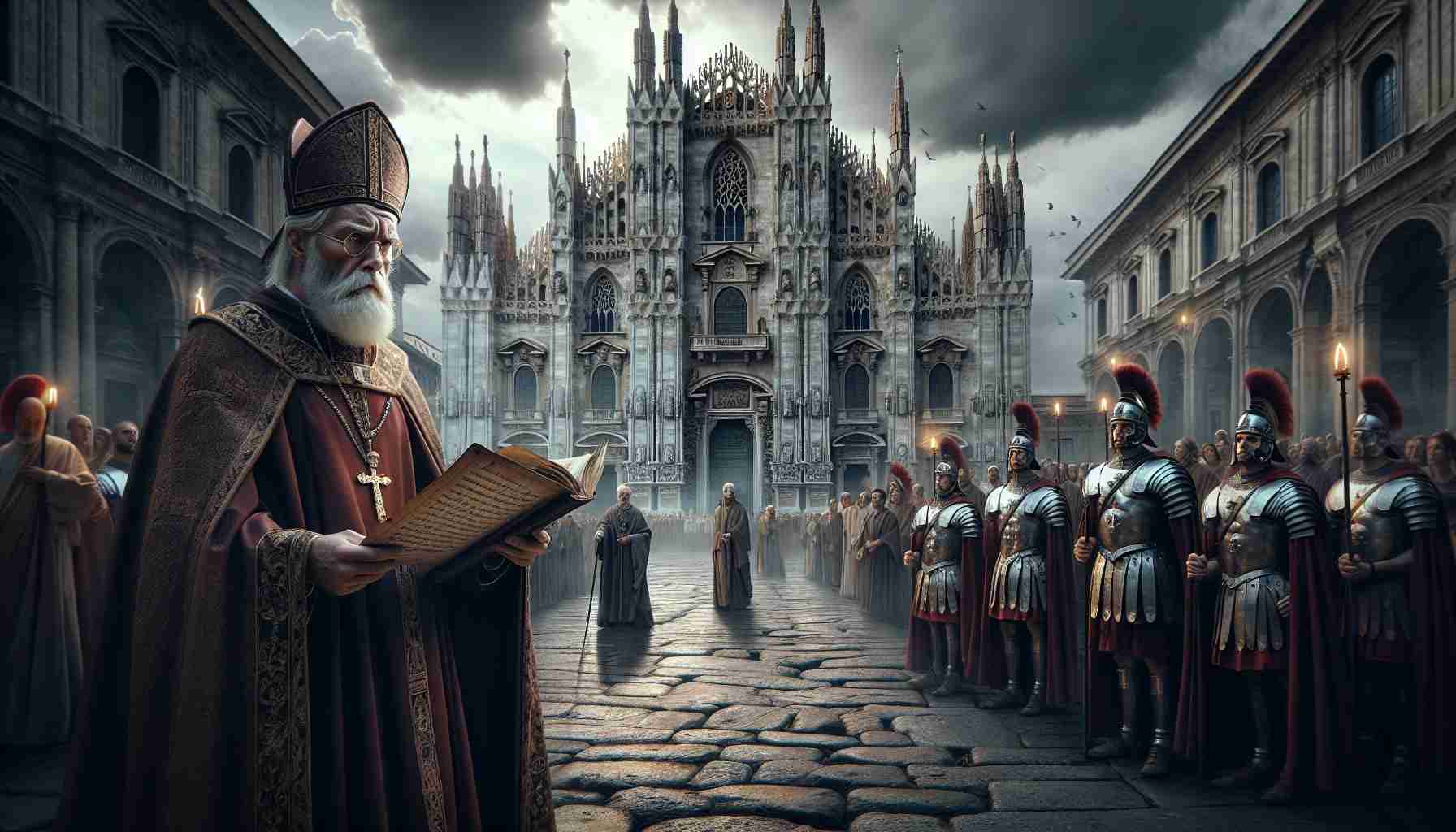

Streets coiled tightly around the Cathedral of Milan like the iron vines of a siege. The air hung heavy with whispers—traders paused in their stalls, senators muttered between marble columns, and even couriers slowed their mounts. Rome’s might had stilled before an unarmed door.
Above the cathedral, clouds pressed low as if the heavens themselves bore witness. Within those stone walls, Ambrose, Bishop of Milan, knelt before the altar—not with fear, but with a grief that carved lines deeper than age alone. A shepherd could not abandon his flock, even when the wolves wore imperial purple.
The year was 387 A.D. From Thessalonica, the blood of innocents had cried out like Abel’s from the earth. A mob there, enraged by a soldier’s misdeeds, had slain the imperial governor. Retaliation came swift and brutal. Theodosius I, Emperor of the East, had unleashed his wrath. Seven thousand perished in a single day beneath Roman blades—men, women, children. Their crime? Being in the presence of vengeance.
Ambrose had read Isaiah’s words that morning, as he always did before dawn: “Cry aloud; do not hold back; lift up your voice like a trumpet; declare to my people their transgression…” The parchment trembled in his hands, not from age but from purpose. A trumpet is not silent before kings.
Theodosius arrived days later, clad in the laurels of conquest. His procession clattered over ancient stones, the iron shod hooves of his warhorses ringing louder than any choir. Citizens bowed. Bishops watched. The oak cathedral doors loomed—open only to the humble.
Ambrose waited on the threshold, robes plain, face weathered by vigils and fasting. All around him, silence ruled.
The emperor dismounted with imperial grace, his sun-emblazoned cloak trailing behind. His confidence faltered when Ambrose did not step aside.
"You come to the temple of the Prince of Peace," Ambrose said, eyes steady. "But your hands are stained with blood."
Theodosius stiffened. "I am emperor by God's anointing. Shall you judge the crown?"
"I am a bishop by God’s call," Ambrose answered, voice clear as marble cracking. "And I will answer for your soul as surely as my own."
Gasps flitted from behind columns, where attendants dared not breathe.
Theodosius stared at the cathedral’s open doors. Inside, incense swirled like prayers still untainted. Outside, justice demanded a toll.
"I did what law required," the emperor began.
"And God’s law?" Ambrose said. "The law that sees Rome’s strength not in vengeance, but in mercy? The killing of thousands cannot pass as justice. You are a man, not a god."
Never before had a bishop spoken thus to Caesar.
A heartbeat stretched.
Then Theodosius—conqueror of Goths, restorer of Christian unity, sovereign of an empire stretching from the Danube to the Nile—lowered his gaze. The doors did not close, but Ambrose did not yield.
"You must repent," Ambrose said. "Publicly. Humbly. For your soul’s sake. For the church’s witness."
And so the Cathedral of Milan stood—not as fortress, but as furnace. The emperor returned to his palace that day with no prayer uttered, no Eucharist taken.
For eight months, the most powerful man on earth remained outside salvation’s gates.
Word spread. From Antioch to Alexandria, from Jerusalem to Rome, tales were told of the bishop who defied a tyrant not with arms, but with truth. Some whispered it madness. Others—miracle.
Winter passed. Chrysanthemums bloomed. Then, on a day of rare sunlight in late spring, Ambrose stood again before the same door.
This time, the emperor came not as sovereign but penitent. His golden circlet left behind, purple removed, he was shorn in sackcloth—barefoot on cold stone. Before the gathered faithful and trembling clergy, he knelt with ashes upon his head.
Tears streaked the ruler’s cheeks. He begged the pardon of God and the church. Ambrose drew near.
"This is the faith that turns power into service," he said. "Enter now as a son, not a sovereign."
Inside, Theodosius wept beside the altar.
Thus, the church preserved its soul. And Christ’s shepherd guarded His flock.
Long after, stone masons carved into Milan’s cathedral arches stories of lions and lambs together. Bishops pointed unmarried nobles to Ambrose’s courage. Emperors remembered the throne was never above the cross.
The bishop died in 397 A.D., honored as a saint. But the echo of that trumpet day on the threshold of Milan did not fade. It became legacy.
And the earth remembers.